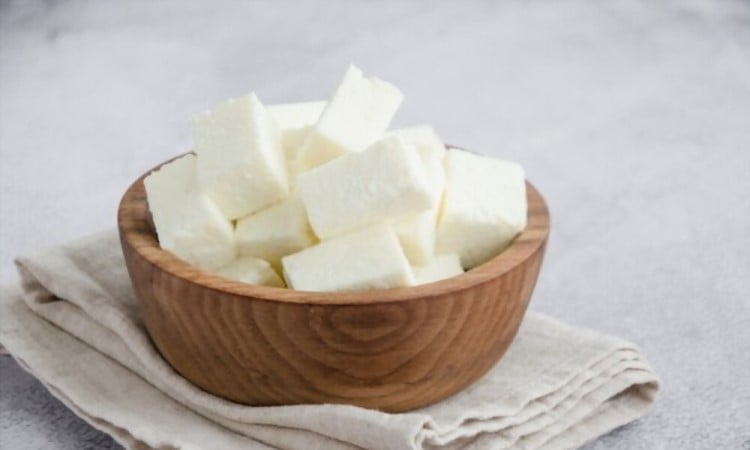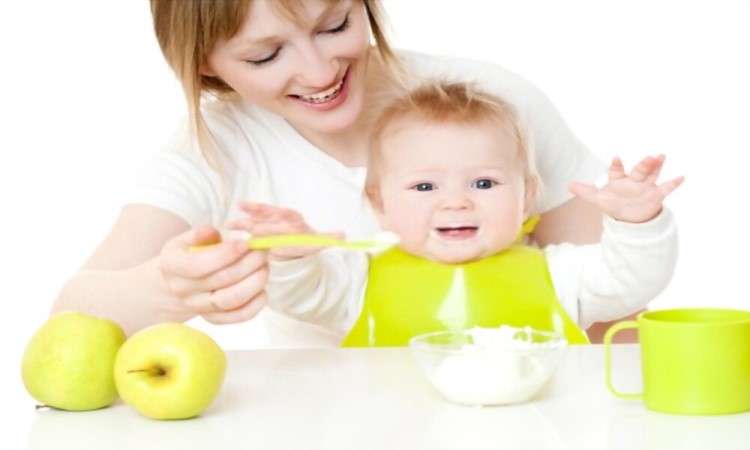Most of us like Paneer, and given it can be made in multiple ways, it is indeed one of the most versatile foods we have in our kitchens. But then, when it comes to giving Paneer to a baby, we may feel confused given the fact that this would be their first time. Giving Paneer to babies surely calls for some precautions, yet, it is one of the most nutritious and versatile foods your baby would ever have.
What Is Paneer?
Essentially a kind of fresh cheese made from milk by curdling it using an acidic agent like curd, vinegar or lemon juice and then made into a kind of a block which then can be grated or mashed or cut in cubes. It is widely used in dishes across the Indian subcontinent, and is known as cottage cheese in English.
If you are wondering how is Paneer different from cheese, then let me tell you that. Cheese is essentially made from crude milk fats and has emulsifiers to give it long shelf life. Paneer or cottage cheese has no emulsifiers and has a shorter shelf life. There is also a difference between the nutritional composition of both Paneer and cheese – cheese is higher in protein content than Paneer while Paneer is suitable for people with heart problems owing to its lower fat content.
Paneer helps lower cholesterol levels in the body as well.
Paneer is simply the desi version of cheese.
Nonetheless, both are powerful sources of calcium and protein and are a delight to have.
When Can I Give Paneer And Cheese To My Baby?

So, when can you give Paneer or cheese to your baby? Essentially, these are two different things and we will answer them separately. As we know, babies are solely dependent on their mother’ s milk for the first six months. Mothers however are often confused as to what to give their baby during the 6 months to 1 year stage. This is because the dietary requirements of these babies’ keep’s on changing till they attain the age of one. This makes it difficult for mothers to gauge what their baby requires.
After six months, parents begin to give their babies more solid food like mashed bananas, boiled and mashed potato, cereals, etc. It is important to give your baby more solid food after the first six months because solid foods have more nutritional benefits and help in the growth and development of your baby.
Related Reading: Everything About Annaprashan – First Rice Eating Ceremony
Giving Paneer To Babies
Paneer is rich in proteins and calcium which makes it an ideal food item to give to a baby. It is produced through curdling enzymes which makes it easy for a baby to digest. According to the World Health Organization, the ideal age to give a baby Paneer is after he/she hits the six-month milestone.
However, there are certain things to keep in mind while giving your baby Paneer. When you are introducing something like Paneer to a baby, start with a small cube a day. Once your baby starts accepting Paneer, you can increase the portion to 2-3 cubes a day. If the baby digests it well and shows signs of liking it, you can give him a few chunks 2-3 times a week.
Please note that if there’ s anyone in your family who is lactose intolerant or has a history of allergies with dairy products, consult your doctor before introducing Paneer to your baby.
What is the nutritional composition of Paneer?
According to NDTV Doctor, 100 gs of Paneer made from cow milk provides 18.3 gs of protein, 20.8 gs of fat, 2.6 gs of minerals, 1.2 gs of carbohydrates, 265 kcal of energy, 208 mgs of calcium, 138 mg of phosphorous. To be more precise, 40 gs of Paneer contains the following:
Per Serving in 100 g Protein 7.54g Fat 5.88g Carbs 4.96g Folates 37.32microgram Calcium 190.4mg Phosphorus 132mg Sat Fat 3540.4mg
Benefits of Paneer For Your Baby
Now that you know the nutritional composition of Paneer, you may as well want to introduce it in your baby’ s diet once he is above 6 months of age. Paneer is known to have a lot of benefits, such as –
- Stronger bones and teeth: Paneer is rich in calcium which makes it an ideal food in building the teeth and bones of your baby. With a good protein content as well, your baby will have stronger bones
- Great source of protein: For vegetarian babies, Paneer is a great source of protein. Moreover, it is also a cheaper source of protein than animal meat
- Helps in baby constipation: Due to its curdling enzymes, Paneer is easily digestible and also helps in treating constipation which is common in babies
- Can be good for lactose intolerant babies: Having a lactose intolerant baby implies careful selection of his food. Paneer is low is lactose and can be beneficial for lactose intolerant babies. It also helps in developing the baby’ s digestive system
- Overall nourishment: Paneer by itself is full of various healthy fats and minerals, making it an ideal food for weight gain in babies as well toddlers
- Improves memory: Paneer is also rich in vitamin B which helps in improving the memory of your baby
- Healthy hair and skin: Paneer is also rich in essential fatty acids such as omega-3 and omega-6 polyunsaturated fats and antioxidants that keep your baby’ s skin plumper and hair healthy
Related Reading: 10 Common Reasons Your Baby Is Not Gaining Weight
When Can I Give Cheese To My Baby?
Cheese is mostly produced from cow’ s milk and is made by the coagulation of the milk protein casein. There is a wide range of cheeses available in the market based on textures, age, etc. Usually cow’ s milk is not recommended for babies below the age of one year. However, the American Academy of Pediatrics (AAP) Section on Allergy and Immunology suggests that babies above six months of age start accepting other solids such as mashed vegetables, cereals, etc. first, giving cheese shouldn’t’ t be a problem. Goat cheese, mozzarella and cream cheese are the common cheese’ that can be given to your baby.
Avoid giving cheeses that have mould, such as blue cheese. Cheese can be introduced to your infant between eight months to one year of age. However, it is more advisable to begin giving cheese to your baby from eight months of age. Cheese can be introduced to your infant in the form of shredded cheese or melted cheese on soft pieces of bread.
Nutritional composition of cheese
A typical 100 gms of American cheese has the below nutritional benefits:
Amount per 100 gms % Daily Value Calories 371 Total Fat 33 g 50% Saturated fat 21 g 104% Polyunsaturated fat 0.9 g Monounsaturated fat 9 g Cholesterol 105 mg 35% Sodium 621 mg 25% Potassium 98 mg 2% Total Carbohydrate 1.3 g 0% Dietary fibre 0 g 0% Sugar 0.5 g 0% Protein 25 g 50% Vitamin A 20% Vitamin C 0% Calcium 72% Iron 3% Vitamin D 6% Vitamin B-6 5% Cobalamin 13% Magnesium 7%
Benefits Of Cheese For Your Baby
- Cheese is rich in calcium, potassium and vitamins which helps in forming a healthy and balanced diet for your baby
- It is another good source of protein for vegetarian babies. This is because it also includes vitamin B12, which is otherwise found in meat
- Its rich content of calories will help in keeping your baby energetic
- Its calcium content helps in preventing tooth decay
Related Reading: 6 Healthy Alternatives To Milk For Toddlers
Precautions To Take While Giving Your Baby Paneer And Cheese
You need to take necessary precautions before giving your baby Paneer. Consult your doctor if your baby experiences any of the following.
- Check for food allergies in your family. If your baby experiences facial swelling as it could be a sign of food allergy
- Check if anyone in your family is lactose intolerant. In such cases consult your doctor before giving Paneer to you kid
- If your baby has moderate of severe eczema due to any skin treatment plan, consult your doctor first
- Make sure that the milk is pasteurized before it is turned into Paneer and cheese. Unpasteurized milk could be contaminated with listeria monocytogenes which are a form of bacteria known for causing harmful foodborne disease, especially in infants
Conclusion

As mothers, we are always concerned about the right things to give our baby to help boost their growth and development. After our baby turns 6 months of age, we realize that breast milk alone isn’t sufficient for our baby’ s growth and development. Hence, we look to other sources of nutrition for our baby such as mashed vegetables, Paneer, etc.
However, if given in the right proportions, Paneer and cheese could be an excellent source of nutrition for your baby. Paneer and cheese are usually cut into smaller portions and paired with different types of food such as mixed vegetables, eggs, fruit or vegetable purees, etc. You can look up for some recipes online to pair Paneer and cheese with before giving it to your baby. If you want to take precautions, you can introduce Paneer to your baby when he is around 8 months with just a small piece or two. Watch for 3 days for any reaction.


